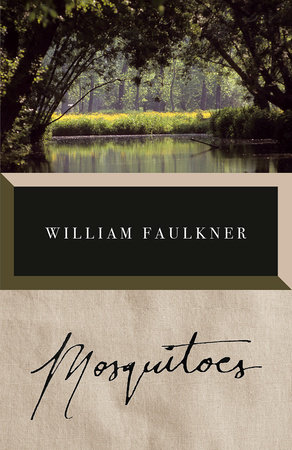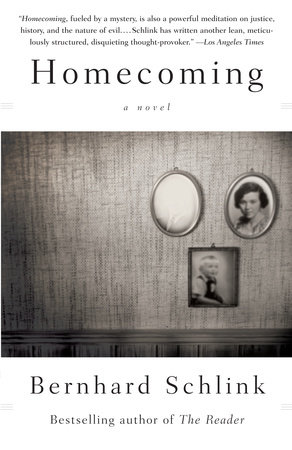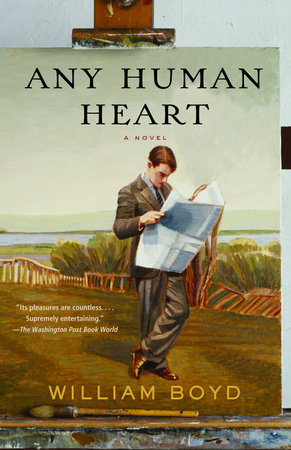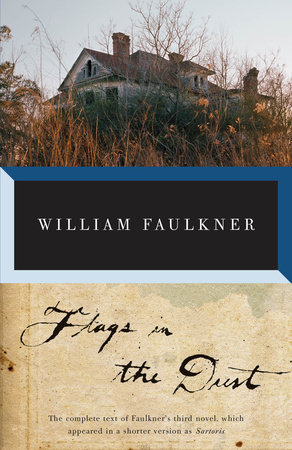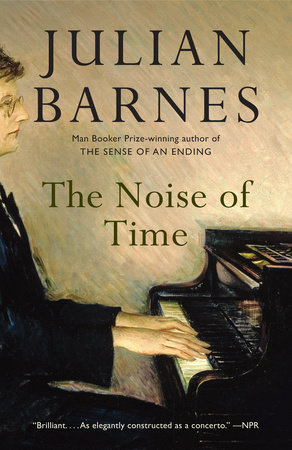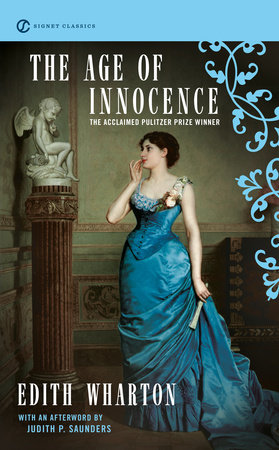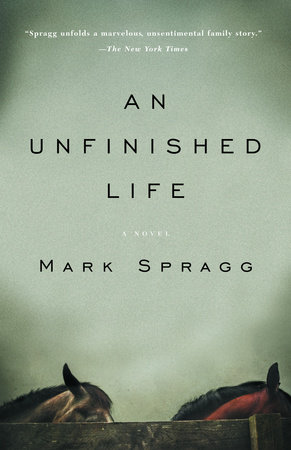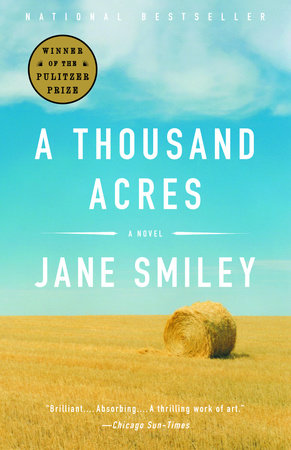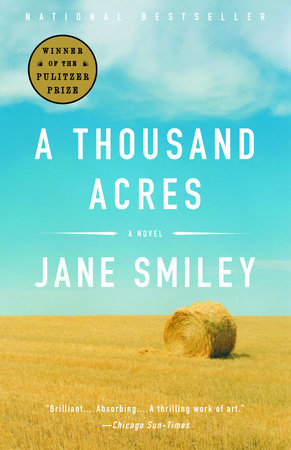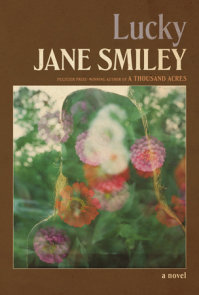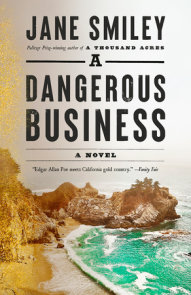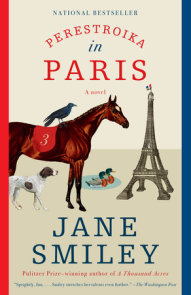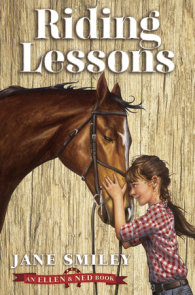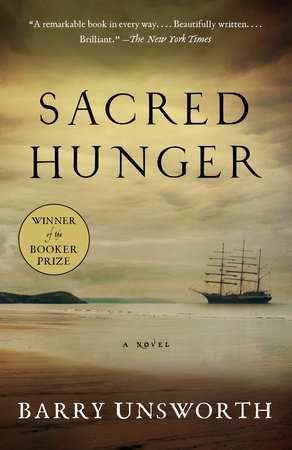Author Q&A
A Conversation with Jane Smiley
Ron Fletcher interviewed Jane Smiley and wrote the reader’s guides for two previous Smiley novels, The All-True Travels and Adventures of Lidie Newton and Horse Heaven. He teaches English at Boston Col-lege High School in Massachusetts. His reviews and interviews have appeared in The Boston Phoenix as well as The Christian Science Monitor. Daunted and haunted, Ron continues to work on his first novel.
Q: More than a decade has passed since the publication of A Thousand Acres; how do you feel about the novel today?
A: A few summers ago, I wrote a piece on the novel for The Washington Post in which I said that I didn’t like it and I wouldn’t write it again. I argued that philosophically A Thousand Acres, like King Lear, asks what is love, and then proposes something of the same answer: love is an exchange. Lear says to his daughters I gave you everything, and in return he expects fealty, submission, and honor. When Lear says I gave you everything he means not only his kingdom but everything, and that’s what he wants in return.The action of the play proves that the idea of love as an exchange amounts to nothing. By the end of Lear no one loves anybody: everyone’s either dead or grieving or resigned to life in a completely impersonal and terrifying world.
I ended up repeating this quid pro quo version of love in A Thousand Acres, but now I see the play and thus my novel quite differently. My attitudes about life and the world and love were transformed after I wrote King Lear–bite my tongue, I mean after I wrote A Thousand Acres.
Q: What now is your understanding of love vis-a-vis these works?
A: The sort of love Shakespeare depicts in The Winter’s Tale makes more sense to me now than the one he offers in Lear. Although Shakespeare presents a similar family situation in this later play, he proposes a much different definition of love. The Winter’s Tale suggests that love is a gift from outside of the world and that the hallmark of love is forgiveness. This sort of love makes salvation of the family possible, whereas its opposite in Lear tears everyone apart. Several years separate these plays, yet I think that they speak to one another about what love is and reveal the extent to which Shakespeare’s mind changed.
Q: What changed your mind about King Lear?
A: Well, time and experience in general as well as a symposium of the World Shakespeare Congress that I attended in Los Angeles a few years ago. During a discussion of A Thousand Acres, one panelist pointed out that when Shakespeare was writing King Lear his father seemed to be a victim of an Alzheimer’s-like disease, some kind of senile dementia. Prior to hearing this news I had always seen Shakespeare as identifying with Lear in the sense that he was a man and he wanted the unquestioned fealty of the women around him. I always thought the play was about how Lear failed to enter into an actual relationship with his daughters from beginning to end.The relationships at the beginning of the play seemed as false as those at the end, if only in a slightly different way.
Q:Your sympathies shifted?
A: They did. I now think that the idea of Shakespeare identifying with his daughters is more psychologically true than that of his identifying with Lear. When you’re in a situation when a family member has a mental illness or a mental decline you feel that there is no possible normal role that you can have in relationship to that person: if you live your life in a normal way, then you feel like you’re not fulfilling the needs of that person, which are very great, and yet it’s impossible to live your life as a saint.
So, I suddenly saw Shakespeare as torn in his personal life between being like Goneril and Regan, who seem like more or less normal women given their anger and resentment, and Cordelia, who seems like a saint but is not very believable.
Once I had that change of heart about where the essence of Shakespeare’s imagination was in the play, then I began to see King Lear differently and as a result to see A Thousand Acres differently.
Q: Yet the novel does convey and question convictions you held when writing it, no?
A: That’s true. No writer can write without a sense of conviction; it’s absolutely necessary. Without conviction you can’t go forward or put anything down.As soon as you put something down with that fabulous sense of conviction, however, things change, truths shift. So, you put the next thing down with conviction.
Q: What convictions lie at the heart of A Thousand Acres?
A: Well, A Thousand Acres has always been an abstraction for me because it wasn’t based on any actual experiences in my life: I didn’t come from a farm; I didn’t suffer abuse; I didn’t grow up with just my father. The novel was entirely constructed around King Lear, so it’s entirely abstract in terms of its relationship to my consciousness. Even so, it drew on feelings that I had about patriarchy, environmental issues, and western history since Shakespeare’s time. I had very strong and systematic views about all these things, and the novel sort of drew on the emotional content of those views. And a relatively aggressive feminism was at the heart of those views.
Q: Some see A Thousand Acres as the work of a polemicist, while others find it an accomplished fiction that examines but remains unobscured by competing ideologies.
A: I like to think that any ideology in the novel is hidden well. For example, Ginny gets to be an unsophisticated and uneducated feminist who appears to come to her conclusions on her own, but that’s not me. I came to her conclusions with a certain theoretical background, and then I just imagined another way for Ginny to approach such issues. There’s a necessary sleight of hand there.
Q: How do you feel about your work being appropriated to push a particular politics?
A: I learned early on that you have no control about how the literary system you constructed will appear to others. I recall when The Greenlanders was endorsed by an extremely conservative organization that was fooled by the book’s archaic tone into not seeing its radical politics.
The other thing is that all literary systems have a consciousness and a subconsciousness.You don’t know the total content of what you’ve constructed, because there’s this underground area created by the cultural moment in which it was authored as well as that in which it is read. President Bush could read Moo today and pick up on not only what I put in there, but things formed by the culture–things over which I had no control. That he might give the novel a reading I would not be able to share makes his reading no less valid.
Q: Doubtless some readers encounter A Thousand Acres before King Lear, allowing your work to influence or at least color Shakespeare’s. Rather heady stuff.
A: Absolutely. Those girls who read A Thousand Acres in high school then go on to read King Lear will never read Shakespeare the way they would have read it had they read it cold. And I think that’s a good thing. It’s also inevitable: no person’s literary history occurs in the same order.
Q: When considering your fiction do you think in terms of a body of work or individual novels?
A: When I go to a shelf of Dickens’ books or Shakespeare’s plays I see them all at once; they exist simultaneously. In their lives, though, they didn’t exist that way at all: they evolved out of one another. One of the things we don’t pay enough attention to is the idea that each book that a writer writes evolves both from the life that he has lived and also the previous books he has written. Each book teaches something, provokes, and makes him change his mind about something. Then that mind goes on to write the next book, which inevitably has a different take on things. So, I think we should think of books not in terms of comparing and contrasting one with another, but instead ask how did this book evolve out of that one. What did Dickens learn in The Pickwick Papers that he put to work in Oliver Twist?
Q: How does this view inform your perspective on A Thousand Acres?
A: Because I didn’t die at the end of A Thousand Acres, I can’t help going on and thinking of things differently. There’s nothing I can do about it. So, A Thousand Acres is not my final word on any issue; it’s just a place that I passed through at that point in my life.
After I passed through that place, I had another child, I moved to California, my marriage broke up, and my children grew up. I went on to live in a place and environment where issues presented themselves differently, thus I wrote with conviction about the next thing.
Q: Do you regard all of your novels as having receded for good?
A: No. There is an exception. I feel that I could come back to Horse Heaven in ten years and make it better, but A Thousand Acres and the others are artifacts of their time and my life. It’s much more interesting to go on and write new things than to fiddle around with the artifacts. So, I don’t have much attachment to any of the books that I’ve written simply because they aren’t current and they don’t represent what I’m thinking. Each is a husk or a shell–some indica-tion of where I’ve been.
Q: What has hindsight revealed about the significance of winning the Pulitzer Prize with A Thousand Acres?
A: It was and remains very significant; it meant that I was successful. I got a lot of money and promptly changed my life: I moved to California, bought horses, and began a different way of living. But it didn’t have any effect on my sense of self as an artist.
Q: What do you think of the film of your novel?
A: I have no thoughts about it at all. I was happy to cash the check–that’s about my only thought.
Q: You once said that the movie made you glad you were a novelist.
A:Yeah, that was my other thought.
Q: A Thousand Acres represented the tragedy in your plan to work in four distinct genres. The Greenlanders, an epic, preceded it. Later came the comedy Moo followed by the romance The All-True Travels and Adventures of Lidie Newton. How did your last novel, Horse Heaven, relate to this cycle?
A: I have a theory about literary form: each time you’re working in a single genre you’re niggled by its limitations and the opportunities of another. For instance, you can’t tragically kill off the main character of your comedy. When I got to Horse Heaven, I wanted to do everything–epic, tragedy, comedy, romance, realism, and fantasy. I wanted the whole cake rather than just one piece.
Q: What’s the next cake looking like?
A: Well, the next cake is much simpler. It looks like a tale about a mysterious stranger. It will be a straight-forward realist novel more than anything else.
Q:Your subject?
A: The ’80s and Reaganomics. One of the things that fascinates me about that period is how government actions so rapidly caused chaos. Congress said let’s fix the Savings and Loans disaster this way, and individuals all over the country promptly engaged in corrupt behavior and destroyed an entire industry and endangered the savings of millions of people.
Q: What occurs at the intersection–or collision–of the individual and the collective, the social and the solitary is at least one prominent motif of your fiction, no?
A: I’ve always been interested in the ways that history manifests itself through individual actions and how large-scale events play themselves out in personal, private lives. What hap-pened under Reagan in the ’80s is another opportunity for me to examine how an individual and his sense of his own autonomy are deeply embedded in the fabric of national life.
Q: What challenges have you faced in moving from Regan to Reagan?
A: Each novel is a kind of test.When I set out to write A Thousand Acres, I had King Lear in front of me and I followed it. I knew where I was going. If I strayed from the path, I would backtrack to return to it.
With my present novel, I have no idea, no master plan, which is something I would never have been able to tol-erate ten years ago. Now, I just say let’s do this and let’s try that. And I write with a faith that it will all work out in the end. And I’m sure that my faith, like all true faiths, will be totally satisfied.



